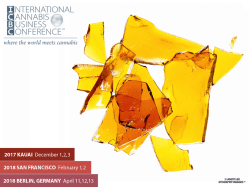
Concentrates, extractions, infusions – call them what you will – many entrepreneurs in the cannabis space are hedging their bets to play in, if not dominate, that sector of the new market. For decades Americans developed a history of consuming cannabis almost entirely in flower form. But with the liberalization of the plant from prohibition status, innovation is flourishing and imbibing has found new forms. New takes on old themes include edibles, tinctures, lotions, and other products requiring some sort of process of extraction. Perhaps most intriguing is the relatively new form of ingestion – dabs.
In the past five years, I have personally witnessed a giant shift in many under and above-ground members of the cannabis culture to smoking highly concentrated cannabis oils and resins out of “rigs” operating at extremely high temperatures. Likewise I have seen a move toward vape pens, particularly in populations aiming to be discreet in their use (let me take this moment to stereotype soccer moms.)
There is a solid argument to be made that dangers exist with respect to these extractions in terms of unknown quantities of pesticides potentially lurking in concentrated amounts. This is why we legalize and regulate! One difference between the pen and the rig, however, is that with the pen we have a corollary in e-cigarettes and therefore some semblance of understanding its effects on human physiology. But with traditional dabbing, each person is an experiment in their own home.
An article published this week by the Portland State University Department of Chemistry suggests that heating butane hash oil (BHO) at extremely high temperatures can result in toxic, carcinogenic byproducts which are not seen at lower levels of combustion, such as with a vape pen.
From Genengnews.com:
“Many of the terpenes that the researchers discovered in the vaporized hash oil are also used in e-cigarette liquids. Moreover, previous experiments by Dr. Strongin and his colleagues found similar toxic chemicals in e-cigarette vapor when the devices were used at high-temperature settings. The dabbing experiments in the current study produced benzene—a known carcinogen—at levels many times higher than the ambient air, the researchers noted. It also produced high levels of methacrolein, a chemical similar to acrolein, another carcinogen.
“‘The results of these studies clearly indicate that dabbing, although considered a form of vaporization, may, in fact, deliver significant amounts of toxic degradation products,’ the authors concluded. ‘The difficulty users find in controlling the nail temperature put[s] users at risk of exposing themselves to not only methacrolein but also benzene. Additionally, the heavy focus on terpenes as additives seen as of late in the cannabis industry is of great concern due to the oxidative liability of these compounds when heated. This research also has significant implications for flavored e-cigarette products due to the extensive use of terpenes as flavorings.’”
According to the study, potentially cancer causing chemicals are released when the oil is heated above 750 degrees and that benzene, a known carcinogen, is emitted when the heat goes over 932 degrees. Thus, it is important to keep those temperatures as low as possible if you prefer dabbing. The cannabis community is extremely innovative and it is imperative that we allow scientific studies to determine the safety of each and every new product that emerges.
Of course, scientific studies are easier for researchers to conduct when scientists aren’t restricted by prohibitionist policies. As more states legalize and regulate cannabis, the cannabis community can be better informed and, hopefully, the federal government will soon stop putting up so many roadblocks that prevent important scientific research.
Stay informed on the latest in extraction technologies, science and regulations from the experts at the International Cannabis Business Conference in Kauai, Hawaii, on December 1-3, 2017. Get your tickets now! After Kauai, the ICBC heads to San Francisco, California, on February 1st and 2nd.






